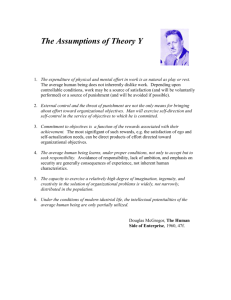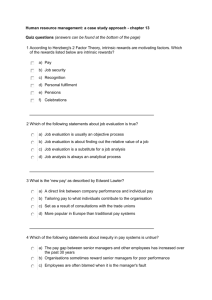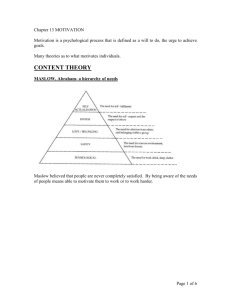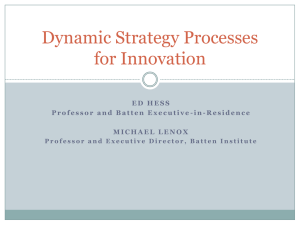Week7
advertisement
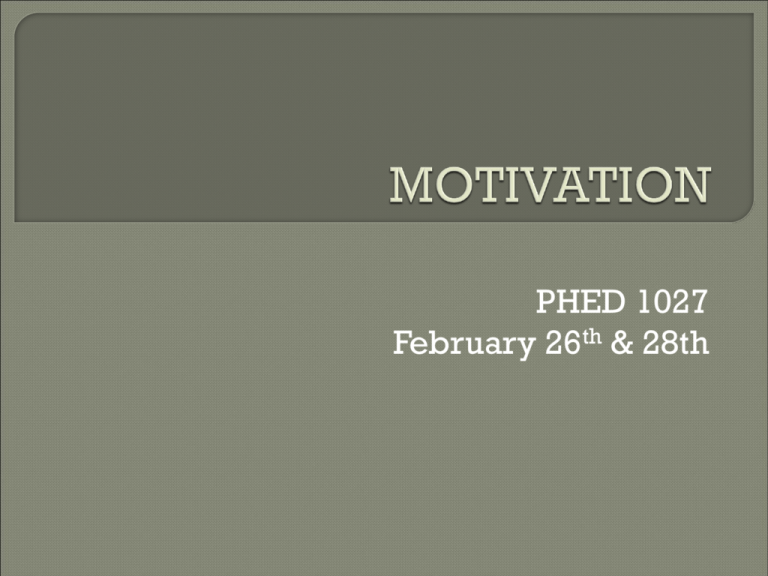
PHED 1027 February 26th & 28th March 1, 2 March 8, 9 Please contact Michelle Zurawski in the Ed Centre gym office Michelle.zurawski@canadorec.on.ca A drive that STARTS or MAINTAINS an activity From the Latin movere, meaning “to move” Psychological term used to explain the WHY of behaviour Instincts Social & drives – earliest theories cognitions, perceptions, emotions – modern paradigm Amotivation – absence of motivation Extrinsic motivation – to receive reward or avoid punishment (external regulation) Intrinsic motivation – to learn, accomplish tasks, and to experience sensations Which is most powerful in PA settings? Competence Control A – e.g. medal – e.g. Bribe highly intrinsically motivated individual is much more likely to sustain effort and performance over the long term (e.g. Exercise adherence) Many theories exist to explain motivation........ Porter & Lawler’s Model Vroom’s Expectancy Model Bandura’s Self-Efficacy Theory Herzberg’s Motivation-Hygiene Maslow’s Needs Hierarchy Adam’s Theory of Inequity Personal Investment Theory Theory of Planned Behaviour Theory of Reasoned Action Self Determination Theory Transtheoretical Model Effort Performance Rewards Satisfaction Personal Investment Outcomes of Personal Investment Degree of effort depends upon one’s motivational state Level of effort is related to the value placed upon the rewards Value may be different for different individuals Will the effort result in a reward? • Performance expectation or probability • Performance-reward relationship Effort is maximized when an individual places a high value on the rewards, and when that person believes the effortreward probability relationship is strong Abilities & Traits • Traits – enduring, stable characteristics • Abilities – trainable qualities Role Perception • Correct perceptions of one’s role are important Rewards that suggest to the individual that he or she is highly competent enhance intrinsic motivation Rewards suggesting that the recipient is no longer fully in control of the reasons for behaviour reduce intrinsic motivation (Carron et al., 2003) Intrinsic Rewards • Sense of accomplishment • Achievement • Doing something positive for the community • Personal growth Extrinsic • Externally administered, tangible Receiving rewards affects the value placed upon them... High Low Less More Depends upon the individual’s perception of whether the rewards are equitable How does satisfaction affect subsequent effort and performance? Individual PERCEPTION of how fairly rewards are distributed Performance is significantly impacted by the perceived equity of rewards • e.g. Comparing salaries and levels of performance on professional teams • This is significant in any organization – volunteer or professional Observed behaviours provide information about personal investment • Direction • Persistence • Continuing motivation • Intensity • Performance These patterns of behaviour indicate the degree to which a person is invested in the activity • Everybody is motivated to do something • Individuals distribute their time, talent, and energy as they choose “Situations are easier to change than people” (Maehr & Braskamp, 1986) How might this affect you as a coach, teacher, instructor? Achievement Personal Growth Life Satisfaction Are these important to sports organizations? PE teacher Coach Personal Trainer Physiotherapist Fitness Instructor Exercise Adherence • Prompting • Contracting • Public reporting • Rewards • Feedback on progress • Goal setting • Social support • Focus on the experience • Focus on the process, not the outcome Read Chapter 8 (Organizational Justice) Pg. 119-136 Answer #1 Interact HUMAN RESOURCE PRACTICES: Volleyball Officials Clinic Saturday, March 15th & Sunday, March 16th Ecole Secondaire Catholique Algonquin 10 AM-4 PM $125.00 Contact Mona Morton at 497-9774 Practical to follow March 29th or April 5th We all have been recipients of demands for justice • “Barb, its not fair that some students got mini eggs and others didn’t” We have all been in the position of demanding justice • I told the builder of my house that, since he replaced the defective windows for a neighbour, he should replace my defective windows Ethical, legal, and appropriate business practices that are just and fair to all individuals involved in an organization FAIRNESS Why is organizational justice so important to PHE professionals? • Custodians • Socially sanctioned • Client / Employee satisfaction • Legal consequences How do clients/employees/workers in an organization judge their work situation – is it FAIR?? Justice perceptions are related to: • Job satisfaction • Job performance • Organizational commitment • Self-perceptions Organizational Justice Procedural Justice Distributive Justice Interactional Justice Were you ever treated rudely or disrespectfully? Were you up for a promotion / raise / job, and didn’t get it when you thought you should have? Why was it unfair? How did you know? How did you react? Did you take action? Distributive justice considers the distribution of goods among members of society at a specific time, and on that basis, determines whether the state of affairs is acceptable. (www.wikipedia.org) Considers the concrete OUTCOMES of the distribution of goods to individuals or groups of individuals Goods include income, opportunities, wealth • Equipment • Playing time • Uniforms • Feedback • Medical attention • Others??? Individuals Groups Classes Equality Equity Need Equity Equality Need Distribution of resources is based on contributions that members make to a group or organization • Effort • Ability (innate or achieved) • Performance How should I have distributed mini-eggs based on the principle of equity? Individual PERCEPTION of how fairly rewards are distributed Performance is significantly impacted by the perceived equity of rewards Did you compare your test mark with those of your classmates? Was your assessment fair? For example, if an individual is underpaid: • Quit • Decreased output • Ask for a raise • “squealing” • Distort reality Resources are distributed equally to all members • Treatment • Results • Opportunity How should I have distributed mini-eggs based on equality? Resources are distributed on the basis of the needs of individuals or teams How should I have distributed mini-eggs based on need? Procedural Justice – refers to the PROCESS that organizations use to distribute goods Procedural justice is an intermediary stage • Procedures, guidelines, policies for making decisions Example of procedural INJUSTICE What are some things that lead to a procedure being seen as fair? • ‘Voice’ – getting a say in things • Consistency – across time and employees • Bias Suppression – avoid personal bias • Accuracy – procedure should be correct • Correctability – appeals mechanism • Ethicality – standards of ethics upheld Interactional Justice – the manner in which decisions are communicated • Substance of the message (informational justice) • Tone of the message (interpersonal justice) Procedural Justice – PROCESS Interactional Justice – COMMUNICATION Distributive Justice - DECISION Were there occasions during your days in secondary school when you believed that the administrators were not just in distributing the school resources? What principles of organizational justice were violated? Discuss. Read Chapter 11 “Leadership” Do Interact #1
